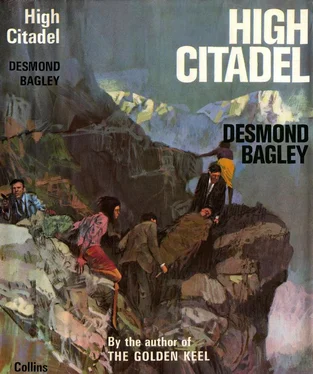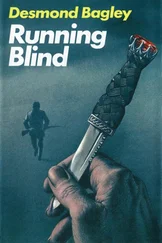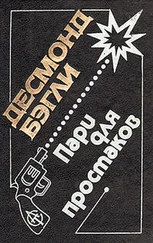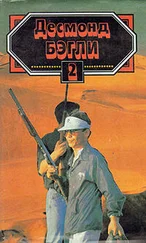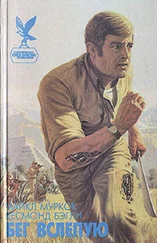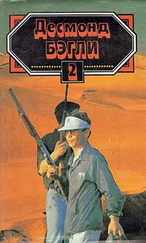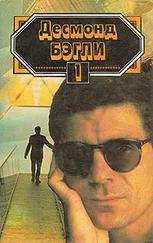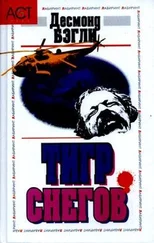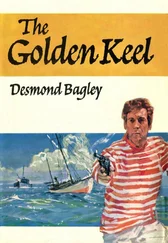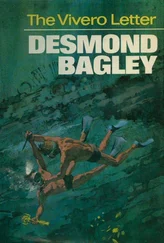Willis stopped fiddling with the chock. ‘Where are they?’ he demanded in a high voice. ‘Why don’t they come and get it over with?’
Benedetta glanced at Armstrong who said, ‘Quiet! Not so loud.’
‘All right,’ said Willis, whispering. ‘But what’s keeping them from attacking us?’
‘We have already discussed that,’ said Benedetta. She turned to Armstrong. ‘Do you think we can defend the camp?’
He shook his head. ‘It’s indefensible. We haven’t a hope. If we can block the road, our next step is to retreat to the mine.’
‘Then the camp must be burned,’ said Benedetta decisively. ‘We must not leave it to give comfort and shelter to them.’ She looked at Willis. ‘Go back and splash kerosene in the huts — all of them. And when you hear noise and shooting from here, set everything on fire.’
‘And then what?’ he asked.
‘Then you make your way up to the mine as best you can.’ She smiled slightly. ‘I would not come up this way again — go straight up and find the road at a higher level. We will be coming up too — as fast as we can.’
Willis withdrew and she said to Armstrong, ‘That one is frightened. He tries to hide it, but it shows. I cannot trust him here.’
‘I’m frightened too. Aren’t you?’ asked Armstrong curiously.
‘I was,’ she said. ‘I was afraid when the airplane crashed and for a long time afterwards. My bones were jelly — my legs were weak at the thought of fighting and dying. Then I had a talk with Tim and he taught me not to be that way.’ She paused. ‘That was when he told me how frightened he was.’
‘What a damned silly situation this is,’ said Armstrong in wonder. ‘Here we are waiting to kill men whom we don’t know and who don’t know us. But that’s always the way in a war, of course.’ He grinned. ‘But it is damned silly all the same; a middle-aged professor and a young woman lurking on a mountain with murderous intent. I think—’
She put her hand on his arm. ‘Hush!’
He listened. ‘What is it?’
‘I thought I heard something.’
They lay quietly, their ears straining and hearing nothing but the sough of the wind on the mist-shrouded mountain. Then Benedetta’s hand tightened on his arm as she heard, far away, the characteristic sound of a gear change. ‘Tim was right,’ she whispered. ‘They’re coming up in a truck or a jeep. We must get ready.’
‘I’ll release the drum,’ Armstrong said. ‘You stay on the edge here, and give a shout when you want it to go.’ He scrambled to his feet and ran back to the drum.
Benedetta ran along the edge of the cutting where she had placed the Molotov cocktails. She lit the wicks of three of them and each flamed with a halo in the mist. The rags, slightly damp with exposure, took a long time to catch alight well. She did not think their light could be seen from the road below; nevertheless, she put them well back from the edge.
The vehicle was labouring heavily, the engine coughing in the thin air. Twice it stopped and she heard the revving of the self-starter. This was no supercharged engine designed for high-altitude operation and the vehicle could not be making more than six or seven miles an hour up the steep slopes of the road. But it was moving much faster than a man could climb under the same conditions.
Benedetta lay on the edge of the cutting and looked down the road towards the bend. The mist was too thick to see that far and she hoped the vehicle had lights strong enough to give her an indication of its position. The growlings of the engine increased and then faded as the vehicle twisted and turned round the hairpin bends, and she thought she heard a double note as of two engines. One or two, she thought; it does not matter.
Armstrong crouched by the cable drum, grasping the short length of electric wire which was fastened to the chock. He peered towards the cutting but saw nothing but a blank wall of grey mist. His face was strained as he waited.
Down the road Benedetta saw a faint glow at the corner of the road and knew that the first vehicle was coming up on the other side of the bend. She glanced back to see if the paraffin wicks were still burning, then turned back and saw two misty eyes of headlamps as the first vehicle made the turn. She had already decided when to shout to Armstrong — a rock was her mark and when the headlights drew level with it, that was the time.
She drew her breath as the engine coughed and died away and the jeep — for through the mist she could now see what it was — drew to a halt. There was a whine from the starter and the jeep began to move again. Behind it two more headlights came into view as a second vehicle pulled round the bend.
Then the headlights of the jeep were level with the rock, and she jumped up, shouting, ‘Now! Now! Now!’
There was a startled shout from below as she turned and grabbed the paraffin bottles, easy to see as they flamed close at hand. There was a rumble as the drum plunged forward and she looked up to see it charging down the slope like a juggernaut to crash over the side of the cutting.
She heard the smash and rending of metal and a man screamed. Then she ran back to the edge and hurled a bottle into the confusion below.
The heavy drum had dropped fifteen feet on to the front of the jeep, crushing the forepart entirely and killing the driver. The bottle broke beside the dazed passenger in the wrecked front seat and the paraffin ignited in a great flare and he screamed again, beating at the flames that enveloped him and trying to release his trapped legs. The two men in the back tumbled out and ran off down the road towards the truck coming up behind.
Armstrong ran up to Benedetta just as she threw the second bottle. He had two more in his hand which he lit from the flaming wick of the remaining one and ran along the edge of the cutting towards the truck, which had drawn to a halt. There was a babble of shouts from below and a couple of wild shots which came nowhere near him as he stood on the rim and looked into the truck full of men.
Deliberately he threw one bottle hard at the top of the cab. It smashed and flaming paraffin spread and dripped down past the open window and there came an alarmed cry from the driver. The other bottle he tossed into the body of the truck and in the flickering light he saw the mad scramble to get clear. No one had the time or inclination to shoot at him.
He ran back to Benedetta who was attempting to light another bottle, her hand shaking and her breath coming in harsh gasps. Exertion and the reaction of shock were taking equal toll of her fortitude. ‘Enough,’ he panted. ‘Let’s get out of here.’ As he spoke, there was an explosion and a great flaring light from the jeep and he grinned tightly. ‘That wasn’t paraffin — that was petrol. Come on.’
As they ran they saw a glow from the direction of the camp — and then another and another. Willis was doing his job of arson.
O’Hara’s ankle was very painful. Before making his move up the hill he had rebound it, trying to give it some support, but it still could not bear his full weight. It made clambering among the rocks difficult and he made more noise than he liked.
He was following the line of beaters that Santos had organized and luckily they were making more noise than he as they stumbled and fell about in the mist, and he thought they weren’t making too good a job of it. He had his own troubles; the crossbow and the sub-machine-gun together were hard to handle and he thought of discarding the bow, but then thought better of it. It was a good, silent weapon and he still had two bolts.
He had a shock when he heard the roar of Santos ordering his men to return to the road and he shrank behind a boulder in case any of the men came his way. None did, and he smiled as he thought of the note of exasperation in Santos’s voice. Apparently the Russian was getting his own way after all, and he was certain of it when he heard the engines start up from the direction of the bridge.
Читать дальше
Конец ознакомительного отрывка
Купить книгу
